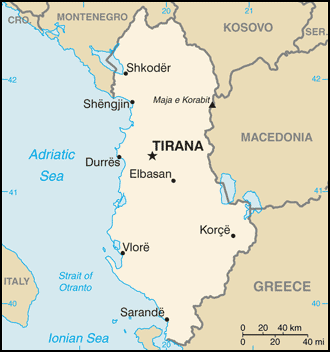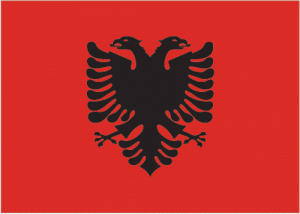Albania
 Aglow Leader: Nexhmije Muca
Aglow Leader: Nexhmije Muca
National Committee
Capital: Tirana (Tirane)
Pray:
- Pray for the Aglow groups and leaders to be strengthened.
- Pray for all the resources and creativity needed to fulfill the intentions of God in the nation of Albania.
- Pray for the Aglow prayer group in the Capital city.
- Pray for godly government leaders. Blessed is the nation whose God is The Lord, the people whom He has chosen for His own inheritance. Psalm 33:12
Proclaim:
- Arise, shine; for your light has come! And the glory of the LORD is risen upon you. For behold, the darkness shall cover the earth, and deep darkness the people; but the LORD will arise over you, and His glory will be seen upon you. Isaiah 60:1,2 (NKJV)
- Lift up your heads, O you gates! Lift up, you everlasting doors! And the King of glory shall come in. Who is this King of glory? The Lord of hosts, He is he King of glory. Selah Psalm 24:9-10 (NKJV)
Interesting Facts About Albania
 Background: Albania declared its independence from the Ottoman Empire in 1912, but was conquered by Italy in 1939 and occupied by Germany in 1943. Communist partisans took over the country in 1944. Albania allied itself first with the USSR (until 1960), and then with China (to 1978). In the early 1990s, Albania ended 46 years of isolated communist rule and established a multiparty democracy. The transition has proven challenging as successive governments have tried to deal with high unemployment, widespread corruption, dilapidated infrastructure, powerful organized crime networks, and combative political opponents.
Background: Albania declared its independence from the Ottoman Empire in 1912, but was conquered by Italy in 1939 and occupied by Germany in 1943. Communist partisans took over the country in 1944. Albania allied itself first with the USSR (until 1960), and then with China (to 1978). In the early 1990s, Albania ended 46 years of isolated communist rule and established a multiparty democracy. The transition has proven challenging as successive governments have tried to deal with high unemployment, widespread corruption, dilapidated infrastructure, powerful organized crime networks, and combative political opponents.
Albania has made progress in its democratic development since it first held multiparty elections in 1991, but deficiencies remain. Most of Albania’s post-communist elections were marred by claims of electoral fraud; however, international observers judged elections to be largely free and fair since the restoration of political stability following the collapse of pyramid schemes in 1997. Albania joined NATO in April 2009 and in June 2014 became an EU candidate. Albania in April 2017 received a European Commission recommendation to open EU accession negotiations following the passage of historic EU-mandated justice reforms in 2016. Although Albania’s economy continues to grow, it has slowed, and the country is still one of the poorest in Europe. A large informal economy and a weak energy and transportation infrastructure remain obstacles.
Government Type: parliamentary republic
Population: 3,088,385 (July 2021 est.)
Ethnic Groups: Albanian 82.6%, Greek 0.9%, other 1% (including Vlach, Romani, Macedonian, Montenegrin, and Egyptian), unspecified 15.5% (2011 est.)
Languages: Albanian 98.8% (official – derived from Tosk dialect), Greek 0.5%, other 0.6% (including Macedonian, Romani, Vlach, Turkish, Italian, and Serbo-Croatian), unspecified 0.1% (2011 est.)
Religions: Muslim 56.7%, Roman Catholic 10%, Orthodox 6.8%, atheist 2.5%, Bektashi (a Sufi order) 2.1%, other 5.7%, unspecified 16.2% (2011 est.)
Interesting Facts information from the cia.gov website. Read more about Albania
